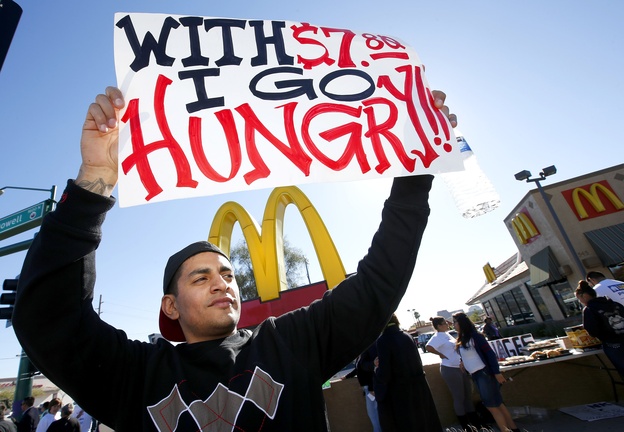The Black Friday protests that accompanied the recent kick-off of the holiday shopping season put Walmart in the spotlight. Media coverage of the demands for better wages at the chain might lead consumers to think that Walmart is ground zero of the issue, but the nation’s largest private employer is only the most egregious example.
Instead, what’s at stake is the ability of millions of workers to make ends meet. The ability of Americans to support themselves and their families is being compromised by a proliferation of low-wage service-sector jobs. Since the end of the Great Recession, the share of U.S. jobs paying below the $15.18-an-hour living wage threshold has risen to 39 percent, forcing many to turn to public assistance. Meanwhile, their employers – including Walmart and other large corporations – are getting state tax subsidies.
It would be heartening for these companies to respond to public pressure by increasing worker salaries, but we can’t count on their doing so voluntarily. That’s why we should boost Mainers’ base hourly pay, which would improve many Mainers’ purchasing power and economic stability. We need to invest in helping the working poor, rather than granting advantages to big businesses that don’t need them.
Opponents invariably predict that raising the minimum wage will discourage employers from hiring, but recent research has found otherwise. Following a 10 percent wage increase, for example, the cost of a $3 hamburger can be expected to rise – but by only a few cents, which can be passed on to customers without large reductions in demand or jobs.
What’s more, if fast-food chains, big-box stores and other companies with a lot of low-wage workers have to pay a higher wage, more of their workers will stay with their jobs longer. This reduction in turnover doesn’t kill jobs; it boosts job stability. The lower amount spent on hiring and training new employees helps offset the cost of the pay increase.
There’s been a lot of debate over the percentage of low-wage workers who draw on public assistance. Because of its size, Walmart is again in the spotlight; the company has said that 5 percent of its associates were on Medicaid, “compared to an average for national employers of 4 percent.” (The company hasn’t addressed how many employees are on food stamps.)
We don’t doubt that other companies have employees who get Medicaid and food stamps, and we’re not against allowing the working poor to continue to receive benefits while holding down a job.
But the companies that employ Medicaid and food stamp recipients are also profiting from other forms of government spending. During the last fiscal year, Walmart was one of the top receivers of Maine Business Equipment Tax Reimbursement subsidies, according to a legislative task force charged with cutting tax incentives. But it’s hard to make a case that the nation’s most profitable company needs the tax break.
Last spring, Gov. LePage vetoed a bill passed by the Legislature that would have raised the state’s minimum wage from $7.50 to $9 an hour by 2016. Though no similar bills are on the table for the next legislative session, anyone concerned about the well-being of the working poor shouldn’t let the matter drop. It’s time that the state direct its largesse toward those who need it most.
Send questions/comments to the editors.



Success. Please wait for the page to reload. If the page does not reload within 5 seconds, please refresh the page.
Enter your email and password to access comments.
Hi, to comment on stories you must . This profile is in addition to your subscription and website login.
Already have a commenting profile? .
Invalid username/password.
Please check your email to confirm and complete your registration.
Only subscribers are eligible to post comments. Please subscribe or login first for digital access. Here’s why.
Use the form below to reset your password. When you've submitted your account email, we will send an email with a reset code.